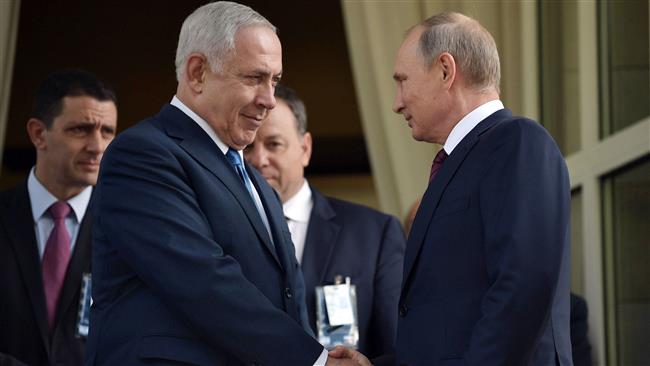
RNA - Prime Minister Benjamin Netanyahu has said that Israel felt threatened by Iran’s growing influence in the Middle East. Netanyahu expressed his Iranophobic view in a meeting with Russian President Vladimir Putin in Russia’s Black Sea resort of Sochi on Wednesday.
Scott Rickard, former American intelligence linguist from Tampa, Florida, and Brent Budowsky, a columnist at The Hill from Washington, in an interview spoke about the issue.
Rickard said Tel Aviv is concerned about the fact that the regime could not carry out its old project to spread sectarian divisions and pave the way for dismemberment of the countries in the Middle East region because of the Iranian-led resistance against Israeli policies, not only in the occupied territories of Palestine but also in the whole region.
“Iran is not a threat to Israel whatsoever. The threat that Israel sees is the fact that their Oded Yinon Plan is being put to a hold by Iran,” the intelligence linguist said on Thursday night.
“They (the Israelis) look at Iran as a threat only because they have no influence on their governments and Iran is autonomous and is not under the Zionist influence,” he added.
Since the victory of the Islamic Republic of Iran in 1979, Tehran has been critical of Israel’s policies in the region, whereas “no leaders [of other states] even dared to speak out against Zionism,” Rickard argued.
“Considering Iran a threat in the region is really a fantasy,” which is a propaganda campaign to demonize the Islamic Republic, he said.
During the meeting in Sochi, Netanyahu tried to illustrate a negative portrait of Iran’s support for the Syrian government, but Russian Ambassador to the UN Vasily Nebenzya disappointed Israel by saying that Iran plays a very constructive role in Syria.
Rickard went on to say that the Israelis are trying to sway public opinion by using false intelligence about the Iranian role in Syria.
The analyst opined that the Israeli regime is “not worried about Iran as much as they are worried about the failure of their effort alongside their allies in trying to topple" the Syrian government.
Tel Aviv is afraid of witnessing that “Iran, Russia and Syria have built up a formidable defense” and have shown great resolve and great restraint against being attacked by Israel, he explained.
Iran and Russia alongside the Lebanese Hezbollah movement have played a major role in supporting the Syrian armed forces to defeat Takfiri terrorists and foiling a US-Israeli plot to partition Syria.
Budowsky, the other guest on the panel, said Netanyahu and President Putin were “establishing some understanding of each other’s position to try to avoid any mistakes that could escalate militarily.”
Israel, which has been reportedly aiding and abetting terrorist groups to topple the government in Damascus, considers Iran’s support for President Bashar al-Assad’s fight against the spread of terrorism a threat to its intervention.
The columnist said that Israel is concerned about having Iran near the occupied territories of Palestine as a result of Iranians’ presence in Syria.
Source: Press TV
847/940